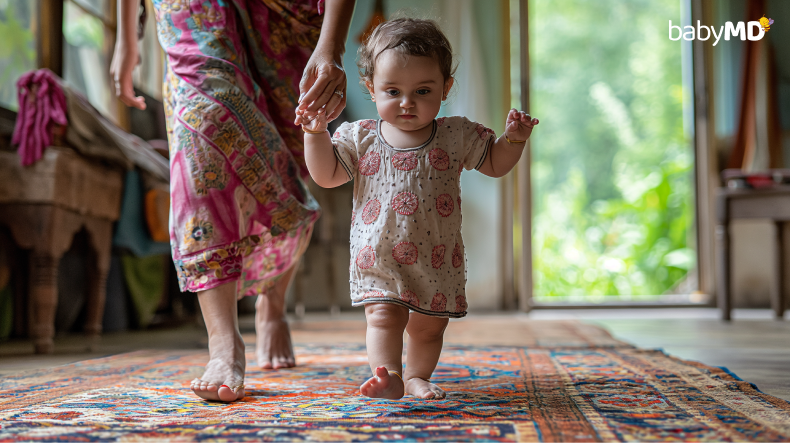Development Milestones of Children from 0 to 3 years

Your baby’s first few years are full of growth, exploration, and remarkable transformation. With time, they learn and begin to perform new activities or milestones that are common for their age group. These milestones are general guidelines that help assess development and map cognitive, motor, language, and social skills. Let us look at what your little one can do from birth to the big three.
Year 0-1
Physical Development: As your baby grows, you notice that they can lift and turn their head while lying on the stomach and control their head movements while sitting with support. Babies also begin to roll back and forth, sit independently, and reach for objects while sitting. They start to crawl and eventually pull up and stand, exhibiting enhancing motor skills.
Cognitive Development: Your baby starts to track and follow moving objects with their eyes. There is a heightened interest in colourful and contrasting images and patterns. Additionally, they begin to understand the concept of object permanence. You will notice your baby grabbing objects and transferring them from one hand to another.
Language and Communication: Your baby begins to coo and make babbling sounds. They also respond to voices with coos and smiles, often showing preference to familiar people. You will notice your baby trying to mimic sounds in the environment and communicate through actions like pointing, waving, or reaching.
Food and Nutrition: Your baby can suck, swallow, and latch to take feeds on the breast or bottle. They begin to signal when they are hungry and establish a feeding routine. Babies also show interest in solid food by six months, transitioning from milk to purees of varied textures to solids as their front teeth erupt.
Motor Skills: You notice your baby wiggle their toes and kick their legs while playing. Additionally, you will see them grasp and shake toys and objects, especially the ones that make noise.
Year 1-2
Physical Development: At this age, your toddler begins to walk with minimum support or independently. They are also able to climb stairs and low-lying furniture. Their fine motor skills improve as they can pick up small objects using their thumb and forefinger. Your toddler also starts to eat on their own using their fingers and utensils.
Cognitive Development: You will notice your toddler has a new vocabulary as they start to say words like mama and dada and attempt to mimic sounds. They begin to point at objects like their body parts when called out and get comfortable around people they know. Your toddler now responds to simple questions with actions, expressions, or words.
Social and Emotional Development: Your toddler enjoys activities and games like peek-a-boo. They now express a range of emotions like joy, frustration, anger, and curiosity. They begin to cry when you leave and are shy around new people. You will notice they have a favourite toy or blanket that they find comfort in when alone or upset.
Food and Nutrition: As your toddler’s molars erupt, they begin to eat solid foods like fruits, soft-boiled vegetables, cooked fish and chicken. They are now comfortable holding a cup and drinking water and juices independently.
Sensory and Perceptual Development: Your toddler begins to use their senses to explore various objects and textures and enjoy indulging in simple cause-and-effect play, sorting games, and blocks. As their hand-eye coordination improves, they utilise their time scribbling and drawing with crayons.
Conceptual Development: As your toddler understands object permanence, or knowing that an object exists even when it’s out of sight, they begin playing hide and seek games and often remember where they left their toys or belongings. They also participate in pretend play and imitate actions, gestures, and tasks.
Year 2-3
Physical Development: Your toddler’s gross motor skills improve as they run, jump, and climb stairs with assistance and begin to play games involving kicking, throwing, and catching. They show readiness for toilet training as they can now independently sit on the potty seat. They also enjoy playing with blocks, building towers, scribbling, drawing lines or circles, and can eat using a spoon or hands independently, indicating more refined fine motor skills. Your toddler may start to develop a dominant hand at this age.
Cognitive Development: You will notice an increase in your toddler’s vocabulary as they begin to form sentences with three to four words. They find it easy to express their needs and respond to you with meaningful words. Your toddler is comfortable following instructions and recognising familiar objects and people.
Social and Emotional Development: At this age, your toddler begins engaging in play with other children and feels comfortable sharing toys and showing empathy. Demonstrating emotional regulation, they now have a wider range of emotions and display self-control. You may notice your toddler being more independent among others and also more defiant.
Sensory and Perceptual Development: As their senses improve, you will notice your toddler sorting and categorising toys and objects easily based on their characteristics. They can now easily manipulate small objects like clay, turn the pages, and tread beads.
Conclusion
Navigating these developmental milestones during the initial three years is a remarkable journey for you and your baby. Insight into these stages and skills gives you the tools to offer vital support and motivation, guaranteeing that your child achieves their utmost potential. Embracing the individuality of your child’s development and creating a nurturing, exciting environment gives them a lifelong purpose of learning, growth, and success.
Ref: https://www.unicef.org/parenting/child-development/your-babys-developmental-milestones

